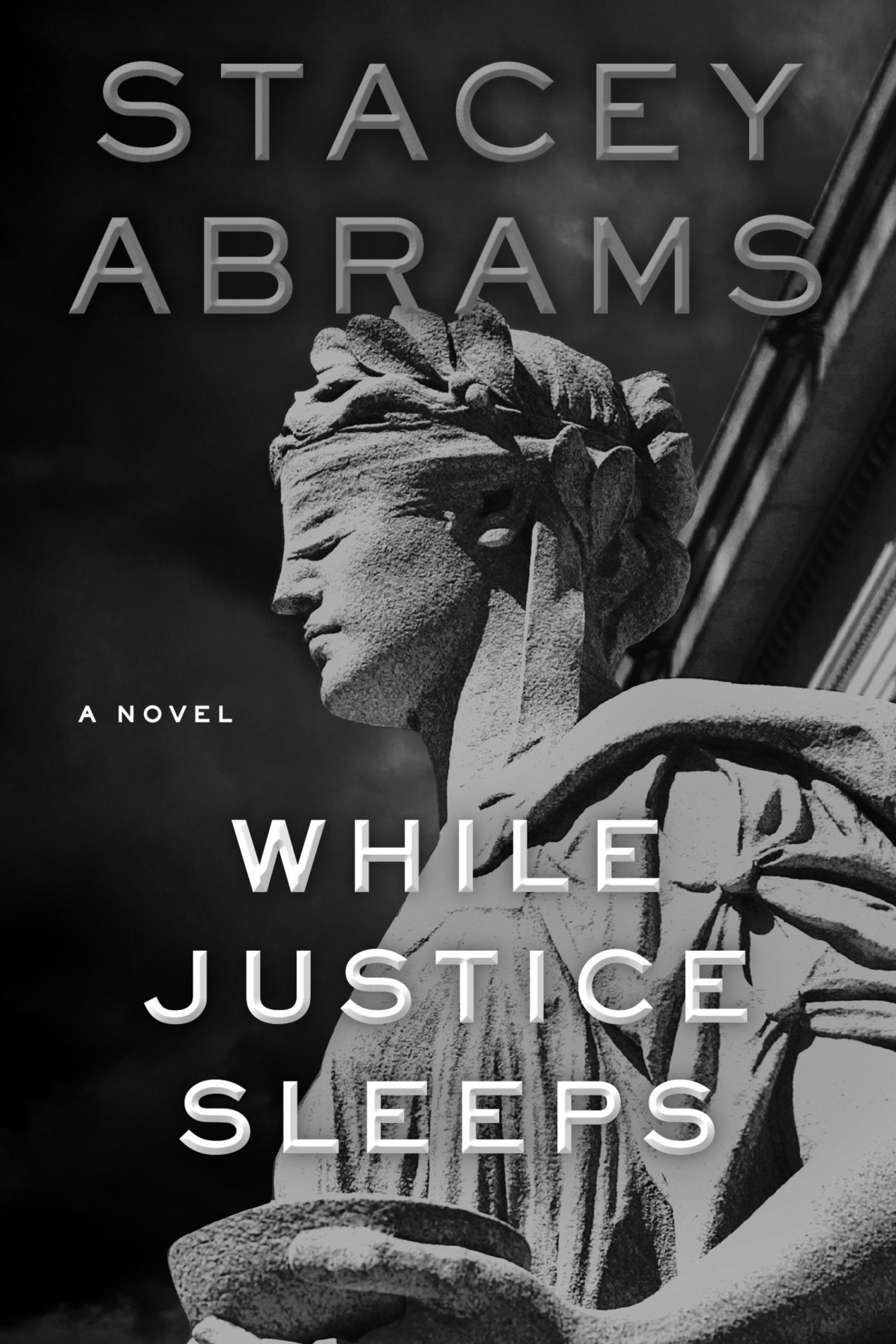A Training in Suspense—Stacey Abrams’ While Justice Sleeps

Stacey Abrams [photo: Kevin Lowery, Atlanta, GA]
Share:
No, he reminded himself. There were enemies. Enemies he had to fight. Because if he told the truth they might not believe him. Worse, they would try to destroy the truth.
—Stacey Abrams, While Justice Sleeps
I was excited and confused when I learned that Stacey Abrams was going to publish a legal thriller in the spring of 2021. Abrams was coming off a historic win. She had cemented herself as a heroine of political lore: the woman who turned (or returned) Georgia blue. Abrams proved formidable, not only as a grassroots organizer but as a strategist, one who knows how to play the long game. As her story goes, after losing her 2018 gubernatorial bid due to long-standing voter suppression laws, Abrams set her sights, not on another political office, but on fighting the widespread disenfranchisement of Black and brown voters. She established the voting rights organization Fair Fight Action and—working alongside other activists including Nsé Ufot, Helen Butler, Rebecca DeHart, DuBose Porter, and Nikema Williams— charted a path to victory, flipping the Senate with wins for Reverend Raphael Warnock and Jon Ossoff, as well as securing the presidency for Joe Biden. Following the elections, Republicans rushed to ratify sweeping voter suppression laws across the United States—a gross violation of civil rights and a testament to Abrams’ efficacy. Currently, she is stumping for voter protection, proposing the For the People Act to combat what she calls “Jim Crow 2.0.”
Stacey Abrams, While Justice Sleeps, 2021 [courtesy of the author]
In this kind of year, wielding this kind of power, why would a tested hero write a fictional story about heroics? Why author a legal thriller? And how might Abrams teach her readership, and the American electorate, a lesson in suspense? Many politicians, activists, and presidential hopefuls— Abrams is all three—have written memoirs, the utility of which for a public figure is undeniable. In Memoir: A History (2009), Ben Yagoda outlines how the form allows author and protagonist to collapse, providing an opportunity for a politician to develop a personal mythology about how they became who they are and, subsequently, why you should vote for them. Abrams, too, has written essays that narrate her personal and professional history. Currently, she is on a dual-purpose book tour, promoting both While Justice Sleeps (2021) and Our Time is Now: Power, Purpose, and the Fight for a Fair America (2020), which details her ongoing voting rights advocacy.
Perhaps the memoir has fallen out of style, despite its utility, because political figures have recently pivoted from journeys-of-the-self to high-octane fictional stories with juridical backdrops. Bill and Hillary Clinton will both publish books in the genre this year, and CNN correspondent Jake Tapper has already published two, The Hellfire Club (2018) and The Devil May Dance (2021).
Abrams’ previous work in genre fiction offers insight into her interest and skill in suspense. Under the nom de plume Selena Montgomery, she wrote her first romance novel while in law school, and has authored seven more to date. A few of her titles include The Power of Persuasion (2002), Rules of Engagement (2001), and Secrets and Lies (2006). These stories are set within institutions such as an FBI agency and an Atlanta law firm, necessitating a balance of opposing elements: mystique and bureaucracy. While Justice Sleeps is the first fictional work that Abrams published under her own name. In implementation, romance and suspense are not so different. From seductive liaisons to unlawful deceit, both wield desire and rely on withholding certain information from the reader. Her new book continues to offer a form of titillation, now in the unexpected context of the Supreme Court of the United States.
In addition to the engagement of desire, While Justice Sleeps seems to have a touch of clairvoyance. The book’s premise: a Supreme Court justice falls ill with a fatal disease; meanwhile, a dastardly president attempts to fill the seat. Further eyebrow-raising prescience occurs as the story ties in an international biomedical corporation that limits access to life-saving treatments for financial gain. In light of Ruth Bader Ginsburg’s death and a pandemic during which vaccines have been monetized and withheld from much of the world, it all seems too true, too relevant. The manuscript for While Justice Sleeps was written more than 10 years ago. Abrams’ fictional prediction became fact.
To combat these diabolical forces, Abrams proffers one heroine: Avery Keene. A chess-playing, problem-solving Black woman—a departure from the White male protagonist paradigm of most legal thrillers—Keene is introduced not as an action star but as a law clerk. Keene’s educational background of Spelman undergraduate and Yale Law parallels Abrams’ own, seeming to suggest an alter ego. Upon news of Justice Howard Wynn’s illness and incapacitation, Keene finds herself in the crosshairs of a constitutional crisis and a contested biotech corporate merger. With a sense of unwavering duty, the overworked opinion writer takes to espionage to untangle how corporate intrigue precipitated the Justice’s demise. When suspicious wire transfers, light computer hacking, and burner phones emerge, Keene is our trusty guide.
While Justice Sleeps employs well-honed mechanics of suspense. According to Angus Fletcher, a professor of story science at Ohio State’s Project Narrative, the technology of fiction depends on two elements: narrative and emotion. In the case of the thriller, narrative and emotion coalesce in the form of a riddle. A thriller must pose a sustaining riddle capable of driving the story and guiding the reader on a journey of discovery. Abrams’ sustaining riddle poses a daunting question: Can democracy withstand a breakdown of the separation of governmental powers due to corporate greed?
Most thrillers contain riddles within riddles. In the case of While Justice Sleeps, small riddles are peppered throughout: numerical codes, indiscernible passwords, cryptic anagrams, and clues hidden under the bed. These riddles provide the reader with a dopamine spike when solved, urging them forward. Fletcher argues that the thriller initiates a chase. The reader, running parallel to the protagonist, is chasing more than a satisfying conclusion—they are chasing their future self. Pages are turned with the hope of consolidating one’s current, limited understanding, with the future version of themself that knows all.
The thriller genre is unabashedly populist. To write a legal thriller for a broad audience requires the ability to explain complex issues pertaining to governance and law. Basics of habeas corpus and power of attorney are defined in the text. In addition to educating and creating a shared understanding, such clarity serves a narrative purpose. Some of the reader’s enjoyment comes from knowing the structure without knowing the outcome. The story arc promises steady escalation and, finally, resolution. The question is not can Keene put the clues together, but how will she do it? Suspense novels rely upon the unknown, but within limits. The same can be said for character-building. Like those in a Western or a Marvel movie, characters in thrillers are overtly good, bad, or on occasion—gasp—the opposite of who they seemed to be. The terms of these categories are defined, occasionally altered, but never left murky. Within these clean margins, corruption is easier to spot.
Clarity and certainty are gifts from fiction that are rare in real life. The timing of this book’s release is pertinent. Published in 2021, Abrams meets a weary and grieving readership. I know many people, myself included, who satiated fear, uncertainty, and boredom this past year with the intellectual escapism of a mystery. There was relief in being enthralled. Intrigue offers a leavening perspective on uncertain outcomes. A suspense novel provides an emotional education; it is a sort of training in not knowing. Part of the pleasure, narratively speaking, is in being guided through the story with guard rails. The thriller suggests that the antidote to uncertainty is not certainty but controllable uncertainty, uncertainty with an endpoint. In the pages of these books, we can trust that our enemies will falter, that the hero will save the day.
Linked to a sense of knowing is the complex issue of trust. Trust is necessary, but potentially fraught, in a political thriller written by a real-life politician. The writer’s experiences encourage a form of authorial trust. Abrams has been behind the curtain. She knows how it works. We can believe the story she weaves might have a basis in her actual experiences. After years of involvement in political dealings, I would not fault her for using this book as a safe place to store a few anonymized backroom conversations. As a reader, I want her to have done just that. Some might fear that public trust in government officials, already deeply eroded, is at risk with such literary endeavors. But the exaggerated, amplified nature of the thriller holds truth at arm’s length. It is not “based on a true story,” no names have been changed to protect the innocent. Reality is, at best, adjacent to this kind of fiction, and often, far off in the distance.
One of the most surprising aspects of While Justice Sleeps is the use of chess as a narrative device and a metaphor for political strategy. Chess is what initiates Keene’s hunt for clues. The Justice communicates with Keene in the form of a well-known chess move, the Lasker Bauer. “The novelty of the Lasker Bauer was the death of the bishops. He sacrificed those pieces to win the game,” says Keene.. As the protagonist, she must find the other bishop and subsequently discover what sacrifice must be made. Chess drives the story, but it also speaks to the kind of strategy Abrams engaged to write such a book, as well as to carry out her work as a political leader. Forecasting is paramount in chess and in politics. Like her character, Abrams exhibits an ability to anticipate and create anticipation. Unlike the nail-biting reader, Abrams is plotting. As clue-planter and plot-twister, she must be many moves ahead of her followers. As a Georgia representative, a candidate for governor, a practicing lawyer, and now at the helm of Fair Fight, Abrams has been strengthened by her ability to see a situation from many sides.
If justice is sleeping, can Abrams—can we—wake it? Perhaps for Abrams and her constituency, both literary and political, this thriller is a form of fortification. While Justice Sleeps covertly offers tools in preparation for what is to come. The narrative tests one’s ability to anticipate and stresses the need to maintain curiosity. Both will be fundamental as there are fewer and fewer journalistic watchdogs. The book primes us in trust and duty but warns against unquestioned belief. It makes plain our desire for clarity and offers small revelations and the pleasure that comes with them. Against all odds Abrams’ protagonist, her alter ego, demonstrates a commitment to discovering the truth. The story initiates a quest for our future, wiser selves. To be trained in suspense is to engage in prediction, anticipation, and—as chess requires—sacrifice.
Courtney McClellan is an artist and writer from Greensboro, NC. She has served as the Fountainhead Fellow in the Sculpture and Extended Media Department at Virginia Commonwealth University and the Roman J. Witt Artist in Residence at the University of Michigan. McClellan’s work has been shown at SculptureCenter in Long Island City, NY; Reynolds Gallery in Richmond, VA; and the Museum of Contemporary Art of Georgia in Atlanta. Her multidisciplinary work addresses the relationship between fiction, performance, and the law. Recently, she was named the 2021 Innovator in Residence at the Library of Congress, Washington, DC.
